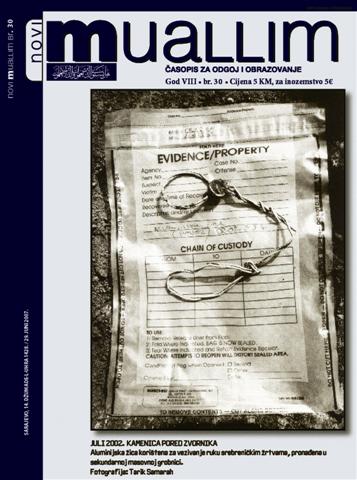GENOCIDE – GUILT AND REPENTANCE
DOI:
https://doi.org/10.26340/muallim.v8i30.1032Abstract
We have, in this article, tried to analyze statements and behavior of war criminals, those that were prosecuted in 1945 in Nirnberg and those that are prosecuted today in Hague. We have found out that statements of the German war criminals, who planed and committed genocide in Second World War, do not differ from the statements of Serbs who planned and committed genocide over Bosniaks. Most of the war criminals plead not guilty and show no signs of remorse or repentance for the crimes they have committed. What more, they do not even feel guilty, because they generally, see the crimes they have committed as nothing but ’just deeds’. For this reason we will often hear them say that they were simply defending Serbian people from the ‘attacks and persecution by Turks’. However, we can conclude, that it is possible to expect forgiveness for the genocide committed over Bosnian Muslims, only if those who planed and committed it will officially admit, repent and ask forgiveness for their crimes. Only in the case of expressed repentance and only when forgiveness is asked for can we expect forgiveness; however we can never expect the victims of genocide to forget those crimes that are committed over them, nor is it psychologically possible.
Downloads
Published
How to Cite
Issue
Section
License
Naknada:
a. Časopis ne naplaćuje naknadu za obradu članaka (APC) i naknadu za podnošenje članaka.
Autori koji objavljuju u ovom časopisu pristaju na sljedeće uvijete:
- Autori zadržavaju autorska prava i pružaju časopisu pravo prvog objavljivanja, pri čemu će rad jednu godinu po objavljivanju biti podložan licenci Creative Commons imenovanje koja omogućuje drugima da dijele rad uz uvijet navođenja autorstva i izvornog objavljivanja u ovom časopisu.
- Autori mogu izraditi zasebne, ugovorne aranžmane za ne-ekskluzivnu distribuciju rada objavljenog u časopisu (npr. postavljanje u institucionalni repozitorij ili objavljivanje u knjizi), uz navođenje da je rad izvorno objavljen u ovom časopisu.


